| September
19, 2022 - No. 16 Funeral
of the Queen and National Day of Mourning
•
What Exactly Is Canada Mourning?
• An Example of What Constitutional
Monarchy Looks Like
• Will Students Be Expected to Stand For
or Sing the
"Royal Anthem" -- "God Save the King" ?
• Parliamentary Convention Called "King's
Consent" --
Corruption from the Top Down
• Emphasis
on the "Stability of the Constitutional Order"
• Stability for Whom and With What Aim?
• How Charles III Intends to "Modernize
the Monarchy"
Letters
to the Editor • From Our Readers
For
Your Information
•
The Proclamation of King Charles
III, St. James Palace,
London, England - September 10, 2022
• Official Canadian Delegation Attending
Queen's Funeral • Transition of the Crown -- What
Government of Canada
Says It Means for Canadians
• Monarchy of Canada -- What Wikipedia
Has to Say
• Who Said What at September 15 Special
Session of House of Commons
Called to Pay Homage to the
Queen
Funeral of the Queen and National Day of
Mourning What Exactly Is Canada Mourning?
 The Marxist-Leninists and many
others have put forward the demand for the non-succession of the
monarchy in Canada and Quebec. They put forward the need for democratic
renewal in which the people are empowered to decide on all matters that
concern them, not a privileged elite which rules on their behalf to
which they must submit without question. To take up this serious
concern head on is to defend the human right to conscience which
necessarily requires vesting sovereignty in the people. The Marxist-Leninists and many
others have put forward the demand for the non-succession of the
monarchy in Canada and Quebec. They put forward the need for democratic
renewal in which the people are empowered to decide on all matters that
concern them, not a privileged elite which rules on their behalf to
which they must submit without question. To take up this serious
concern head on is to defend the human right to conscience which
necessarily requires vesting sovereignty in the people.
The
monarch is not merely symbolic, without meaning to our lives. When
newcomers become Canadian citizens, they are required to take an oath
to the "Queen of Canada." The same is true for members of Parliament
and of the provincial legislatures and the Quebec National Assembly,
for judges and all those whose job is "in the service of the Crown" and
its institutions. Despite this, discussion on what the monarchy to
which we swear allegiance represents does not take place. With all the
pomp and pageantry surrounding the death of the Queen, her funeral and
the dynastic succession to the throne of her eldest son Charles, it is
important to participate in discussions which provide an understanding
of what, exactly, Canada is mourning and celebrating at once.
All the talk from the elites and their media in praise of the
Queen deserves attention because they erect an image with very definite
characteristics said to espouse universal values which everyone
supports. The case is made for the importance of the succession to
continue a constitutional order which is presumably key to our future
stability and happiness. It is not for nothing that those who represent
factional party interests which are antagonistic and are used to divide
the people are united as one when it comes to their praise for the
Queen and the succession of the constitutional order. With one voice
Trudeau, the Liberal, Poilievre, the Conservative and Jagmeet Singh,
the New Democrat, speak to present the Queen as the person of state,
who ensures the stability of the system because she represents the
unity of the nation and is above partisan interests and does not
interfere in political affairs. Is it true? What does it mean? What is
the significance of the monarchy in Canada, in Quebec? For the
Indigenous peoples? For the peoples of the world? Only
the victims of this constitutional order and enlightened forces not
willing to set aside their conscience for career or other gain,
speaking in their own name, are taking a dignified position on this
matter. Only they are bringing forth the actual experience with this
constitutional order which raises the need for democratic renewal so
that sovereignty is vested in the people, not in the graven image of a
fictitious person of state to which everyone is supposed to pay homage.
 It is time now,
more than ever, to explore the truth of what this monarchy represents.
Already the truth about the colonial atrocities committed against the
Indigenous peoples and those enslaved or massacred in the name of
progress or used as cannon fodder to further the cause of the British
Empire are becoming better known. In recent years, the genocidal
violence against First Nations has been brought to the forefront as a
result of the efforts of Indigenous peoples themselves, which led to
the Inquiry into Missing and Murdered Indigenous Women and Girls, the
creation of the Truth and Reconciliation Commission, and the
confirmation of genocide committed against them, including as a result
of the residential school system. To this day, Canada's constitutional
order continues to uphold the Doctrine of Discovery contained in papal
bulls and used by the Queens and Kings of England to establish the
constitutional order foisted on Canada through brutal acts of
suppression of all those who have fought on the basis of their own
right to be, traditions and thought material. All of it is said to be
"legal" and immutable. It is time now,
more than ever, to explore the truth of what this monarchy represents.
Already the truth about the colonial atrocities committed against the
Indigenous peoples and those enslaved or massacred in the name of
progress or used as cannon fodder to further the cause of the British
Empire are becoming better known. In recent years, the genocidal
violence against First Nations has been brought to the forefront as a
result of the efforts of Indigenous peoples themselves, which led to
the Inquiry into Missing and Murdered Indigenous Women and Girls, the
creation of the Truth and Reconciliation Commission, and the
confirmation of genocide committed against them, including as a result
of the residential school system. To this day, Canada's constitutional
order continues to uphold the Doctrine of Discovery contained in papal
bulls and used by the Queens and Kings of England to establish the
constitutional order foisted on Canada through brutal acts of
suppression of all those who have fought on the basis of their own
right to be, traditions and thought material. All of it is said to be
"legal" and immutable.
It is not for nothing that
this constitutional order is based on a fictional person of state as
the symbol of a national unity and universal values which deny the
people's right to be. To claim today that the new monarch will champion
reconciliation and a healthy social and natural environment as it is
alleged Elizabeth II did in her lifetime -- which is patently untrue --
is not only a bad joke but one which cannot be hidden behind the veil
of pomp, pageantry, wealth and privilege. On the contrary, the more
this is on display, the more anachronistic it is seen to be. The
people who take dignified stands are pointing out that in "truth and
reconciliation," the important thing is the truth. And no matter how
hard they try, this truth can no longer be contained by ruling elites
desperate to perpetuate their rule. To serve their interests they say
that no matter the views people are entitled to have about the Queen or
the monarchy, our future depends on defending Canada's constitutional
order. When push comes to shove, this order shows its true essence by
keeping redress for the crimes the state commits and condones against
the people every day out of their reach. Nonetheless,
as the people speak out about their own experience, the heavy chain the
constitutional order forces them to carry around their necks will be
lifted. 
An Example of What
Constitutional Monarchy
Looks Like The opposition of the Ontario
Minister of Education to the just stand of the York District School
Board (YRDSB) instructing the teachers and educators in its
jurisdiction on how to address the significance of Queen Elizabeth II
on the occasion of her death, is a good example of what the
constitutional order that prevails in Canada looks like.
On September 9, the YRDSB, Ontario’s third largest
public school board, issued a memo to its teachers providing guidance
to educators on how to address the death of the Queen in the schools
under its jurisdiction. The memo stated “[w]e request that
school staff please refrain from developing tributes or activities to
memorialize the death of the Queen, as well as displaying objects
associated with the Queen for the purposes of memorializing. For some,
the death of the Queen is very triggering.” Schools
were also asked not to play “God Save the Queen” or
to livestream events related to the funeral and to offer students a
neutral space “to have a break from potentially triggering
media exposure.” In
response, Minister of Education Stephen Lecce used his prerogative
powers as Minister of the Crown, to whom he has sworn allegiance, to
direct the school board and by extension its teachers to
“honour the queen on the date of her funeral (Monday
September 19).” Making it
clear this directive is for all school boards in the province, he said:
“We have made clear our direction that all schools are to
recognize the profound impact of Queen Elizabeth II’s
lifelong and unwavering devotion to public service.”
“I
have directed this board [YRDSB] to implement the province’s
expectation, honour the Queen on the date of her funeral, and enrich
students with a strong understanding of the values and enduring legacy
of Canada’s constitutional democracy.”
A
government spokesperson said Minister Lecce also spoke to all school
board chairs, directors and board leaders and shared an expectation
that “all schools participate in the moment of
silence.”
The
clash between the values of the vast majority of Canadians and those of
the ruling class that are said to be "Canadian values" to which
everyone must swear allegiance, is growing by leaps and bounds. For the
teachers and educators, protecting the well-being of the students, and
teachers and educators, is a fundamental duty. To be directed to sing
hosannas to the symbol of the enslavement, oppression and even genocide
of millions the world over is to deny the right of the entire
population to their conscience. Primary and secondary
students are particularly sensitive to the stories they are
now well aware of related to the residential schools, slavery,
suppression of the rebellions of the people of Québec
against British rule, of the people of Ontario against British rule, of
the Métis, of the brutal acts of war and covert police
actions in Ireland and the countries of Africa and Asia and the
Caribbean and so on. For many, the thought of having a King
“rule over them” is anathema. This is what the
constitutional order in Canada is all about. 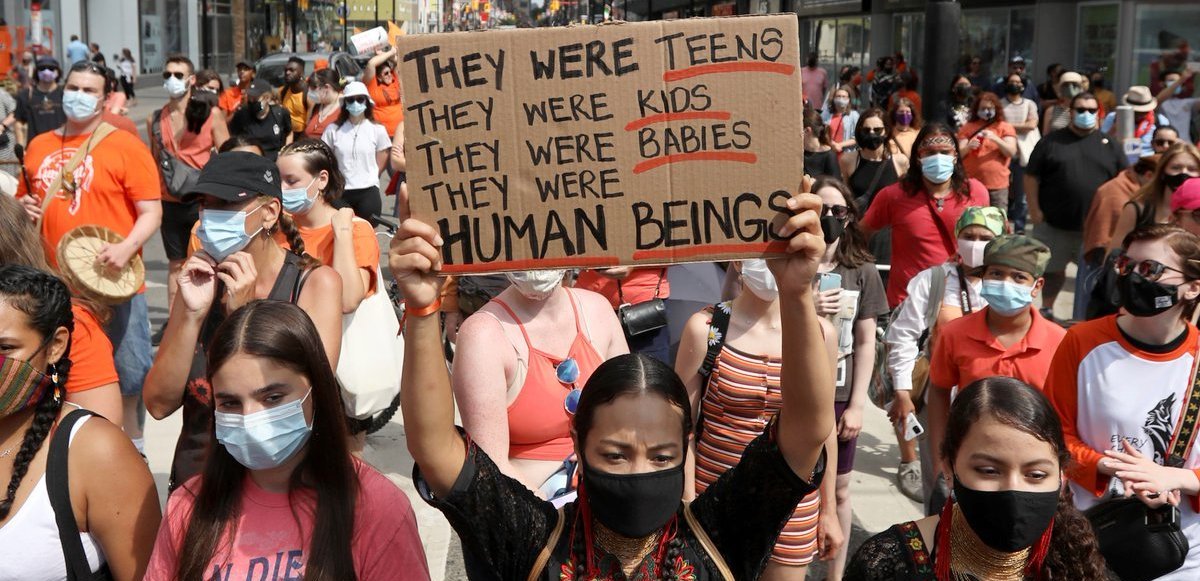
Large numbers of youth
participated in actions condemning the genocidal treatment of
Indigenous children in residential schools. Above action July 1, 2021
in Toronto.
Ontario has not declared September 19
as a holiday for schools and other workplaces but has instead declared
it a provincial day of mourning along with a moment of silence at 1
p.m. This means that many parents will be permitting their
kids to stay seated, or leave the room or simply not go to school that
day. This is just the beginning of the constitutional crisis the ruling
class faces going forward if they persist in dictating what conscience
the people can or cannot have. 
Will Students Be Expected to
Stand For or Sing
the "Royal Anthem" -- "God Save the King"
? 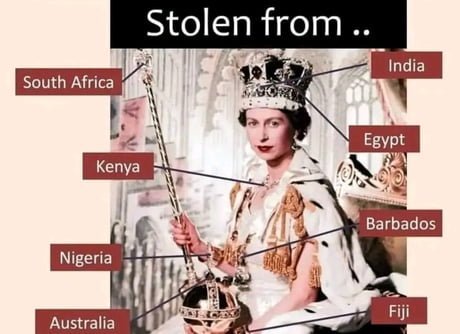 "God Save the King/Queen" is
the de facto
national anthem of the United Kingdom. It is also one of two national
anthems used by New Zealand since 1977, as well as by several of the
UK's territories that have their own additional local anthem. It is
also the royal anthem -- played specifically in the presence of the
monarch -- of the aforementioned countries, in addition to Australia
(since 1984), Canada (since 1980), Belize (since 1981), Antigua and
Barbuda (since 1981), The Bahamas (since 1973), and most other
so-called realms of the Commonwealth. "God Save the King/Queen" is
the de facto
national anthem of the United Kingdom. It is also one of two national
anthems used by New Zealand since 1977, as well as by several of the
UK's territories that have their own additional local anthem. It is
also the royal anthem -- played specifically in the presence of the
monarch -- of the aforementioned countries, in addition to Australia
(since 1984), Canada (since 1980), Belize (since 1981), Antigua and
Barbuda (since 1981), The Bahamas (since 1973), and most other
so-called realms of the Commonwealth.
The lyrics of
the standard version used in the United Kingdom of the Royal Anthem are
as follows: God save our gracious King!
Long live our noble King!
God save the King!
Send
him victorious,
Happy and glorious,
Long to reign
over us:
God save the King! O Lord our
God arise,
Scatter his enemies,
And make them fall:
Confound their politics,
Frustrate their knavish tricks,
On Thee our hopes we fix:
God save us all. Thy
choicest gifts in store,
On him be pleased to pour;
Long may he reign:
May he defend our laws,
And ever
give us cause,
To sing with heart and voice,
God
save the King! Then there is a special Canadian
verse in English that was once commonly sung, in addition to the two
standing verses: Our loved Dominion bless
With peace and happiness
From shore to shore;
And
let our Empire be
Loyal, united, free,
True to
herself and Thee
For evermore. Is this
what the government of Canada is saying Canadian children should stand
for or even sing? One thing is certain: they will be wanting to know
why they should do such a thing. 
Parliamentary Convention
Called "King's Consent" -- Corruption from the Top Down 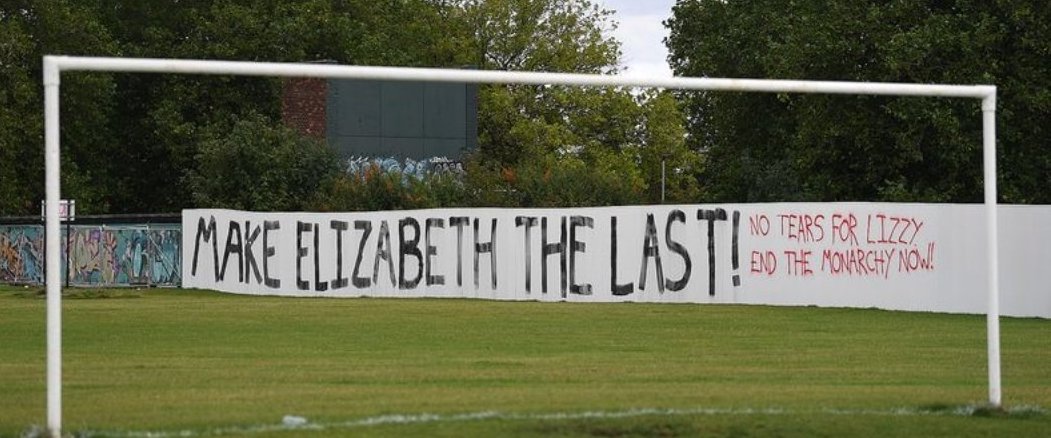
Manchester, England,
September 10, 2022.
Bills affecting the royal
prerogative and the personal property and "personal interests" of the
monarch require what is called "King's Consent." In Canada it is
typically expressed by what is called a "Minister of the Canadian
Crown." It is a "Parliamentary Convention" which exposes how blatantly
the Royals can intervene to introduce or block legislation according to
their personal private interests. The website of
the royal family describes consent as "a long established convention."
This conventions means that "in the United Kingdom, as well as bills
that affect the prerogative, bills affecting the hereditary revenues of
the Duchy of Lancaster or the Duchy of Cornwall require King's Consent.
Bills affecting the latter also require Prince's Consent from the
Prince of Wales in his capacity as Duke of Cornwall. In certain
circumstances, such as for the House
of Lords Act 1999, the consent of the Prince of Wales, in
his capacity as Earl of Chester or Prince and Great Steward of
Scotland, must also be obtained where a bill affects his interests. In
1993, both Queen's Consent and Prince's Consent were required in
respect of the Priests
(Ordination of Women) Measure 1993 that enabled the
ordination of women in the Church of England." According
to the explanation it is all very proper. "Consent is usually signified
in one (in unicameral legislatures) or both houses (in bicameral
legislatures) of parliament, at either the second or third reading, by
a privy counsellor and is recorded in Hansard. Where proposed
legislation which might affect the royal prerogative or the private
interests of the crown is sponsored by the cabinet (as is the case for
most bills considered by parliament), the department sponsoring the
bill must write to the palace giving as much time as possible, but
never less than 14 days before the bill is introduced to parliament. In
the Scottish parliament, consent is signified by a member of the
Scottish government. In the Canadian parliament, Royal Consent can be
signified in only one legislative chamber. In the UK Parliament consent
is signified using the following wording (with similar wording for
Prince's Consent): "I have it in command from Her
Majesty the Queen to acquaint the House that Her Majesty, having been
informed of the purport of the [name of bill], has consented to place
her prerogative and interest, so far as it is concerned on behalf of
the Crown and the Duchy of Lancaster, at the disposal of Parliament for
the purposes of the Measure." If consent is
required but not signified, a bill may make no further progress through
parliament. If a bill is mistakenly allowed to progress even though the
required consent was not signified and the error is discovered before
royal assent has been given, the proceedings may later be declared
void. Where a bill requires the consent of the Prince and Steward of
Scotland or the Duke of Rothesay, the Scottish parliament cannot debate
any question whether the bill be passed or approved unless such consent
to those provisions has been signified by a member of the Scottish
executive. Once a bill has passed parliament and received royal assent,
it is regarded as legally valid by the courts, regardless of any
deficiency in parliamentary procedure, in accordance with the usual
principles of parliamentary privilege. The entire
thing is a fraud because it is a process whereby bills can be changed
before they are tabled in the parliament in the first place. The
Guardian newspaper reported in February 2021 that memos had
been found in the U.K. National Archives revealing that the advance
notice of forthcoming bills allows the monarch to lobby for legislative
changes without actual consent being invoked. The documents were
reviewed by Thomas Adams, a specialist in constitutional law at Oxford
University, who said they revealed "the kind of influence over
legislation that lobbyists would only dream of." The existence of the
consent procedure appeared to have given the monarch "substantial
influence" over draft laws that could affect her, Adams said.
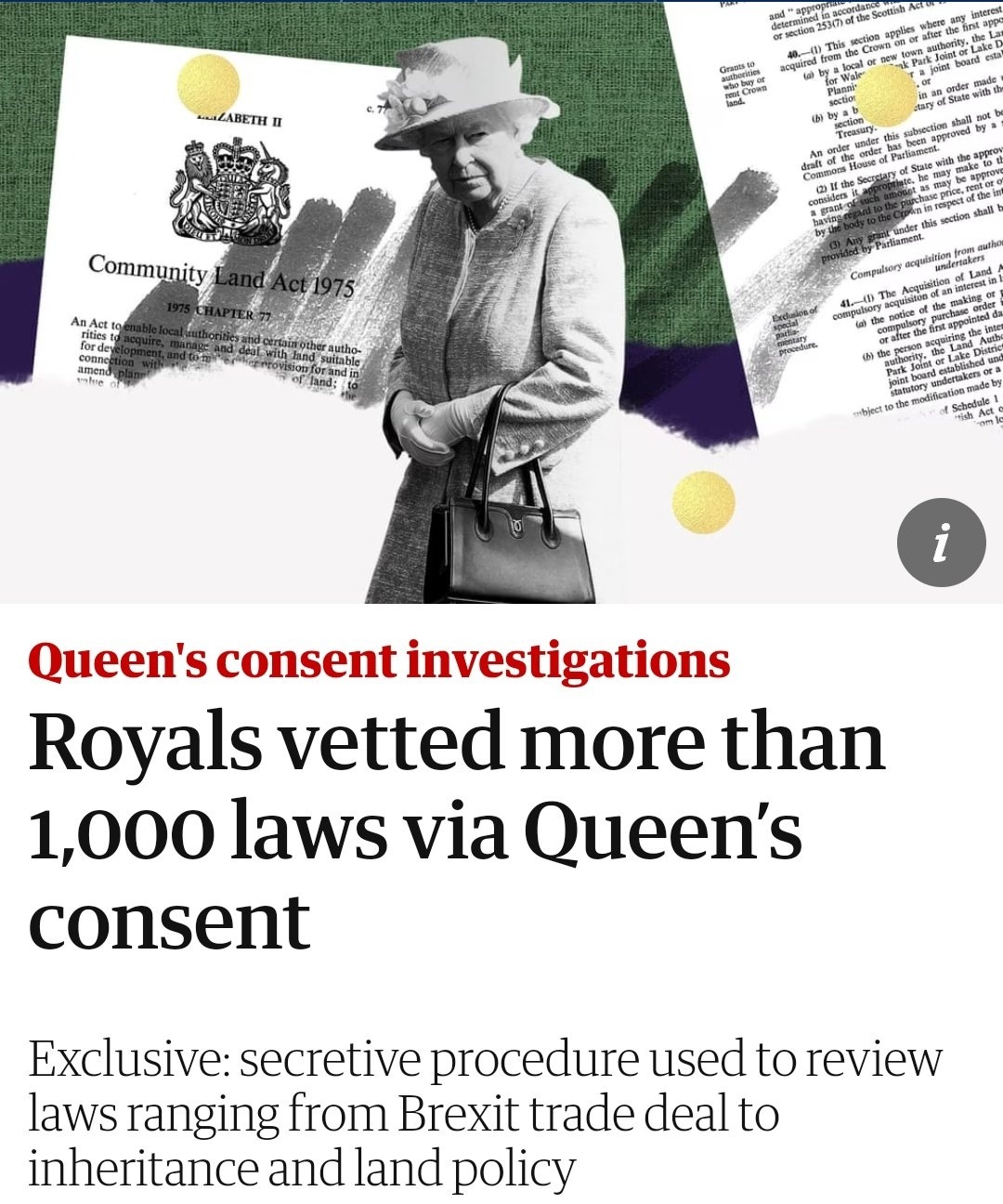 As of 2021, over
1,000 bills had been submitted to the Queen or Prince Charles for
Queen's or Prince's Consent. More than 50,000 people had, by February
28, 2021, signed a petition requesting a parliamentary inquiry into the
convention of Queen's Consent. Buckingham Palace responded to The Guardian, with
typical double speak which avoids answering the question. The Palace
stated that consent was always granted when requested and that
legislation was never blocked. As of 2021, over
1,000 bills had been submitted to the Queen or Prince Charles for
Queen's or Prince's Consent. More than 50,000 people had, by February
28, 2021, signed a petition requesting a parliamentary inquiry into the
convention of Queen's Consent. Buckingham Palace responded to The Guardian, with
typical double speak which avoids answering the question. The Palace
stated that consent was always granted when requested and that
legislation was never blocked.
The facts The
Guardian presented show that Buckingham Palace is known to
have requested changes to draft legislation in some cases; it is not
known how many. In 1973, when a companies bill incorporating
transparency measures was to be introduced in the UK parliament, after
receiving advance notice as required by the consent procedure, the
Queen's lawyer and the trade department agreed an exception for heads
of state. This allowed the Queen to avoid the embarrassment of
disclosure of beneficial ownership of shares by the Crown until at
least 2011. Consent was not required for the bill, as eventually
introduced. The Guardian revealed
that Prince Charles had used Prince's Consent to have proposed
legislation changed so that his Duchy of Cornwall leasehold tenants
would not have the right to buy their homes that was provided by what
later became the Leasehold
Reform, Housing and Urban Development Act 1993. Prime
Minister John Major is said to have expressed his "particular concern"
about this aspect. The government did not wish to grant this
exception, fearing that it would create a precedent for other major
landowners, but ultimately, reluctantly, included the special exemption
to avoid what a Whitehall official described as "a major row with the
Prince of Wales," saying "the will of ministers can prevail over that
of monarchy but a constitutional crisis would add a further dimension
of controversy to the bill which would be better avoided." It
was reported in July 2021 that the advance notice provided by the
consent procedure was used in the Scottish Parliament in 2021 to
arrange for draft legislation to be modified so that the Queen, one of
the largest landowners in Scotland, would become the only person in the
country not required to facilitate the construction of pipelines to
heat buildings using renewable energy. The Scottish government did not
disclose the intervention of the Queen's lawyer when the energy
minister added the exemption to the green energy bill, key legislation
to combat the climate emergency. It is not known why the Queen's lawyer
wanted the bill change, The Guardian wrote.
Since its creation in 1999, the Scottish Parliament has given
the Queen advance notice of at least 67 parliamentary bills deemed to
affect her. It is not known how many were consequently changed. The
Scottish Liberal Democrat leader Willie Rennie asked the Scottish
government in a parliamentary question for a list of acts amended as a
result of exchanges with the Queen's representatives. The Scottish
government ultimately refused to answer the question, but confidential
briefing notes were later disclosed which said that it was almost
certain that some bills had been changed before introduction, but that
as they had not been "amended" in parliamentary terms they would not
have been included. In response to these reports
about consent in Scotland, Buckingham Palace said: "The royal household
can be consulted on bills in order to ensure the technical accuracy and
consistency of the application of the bill to the crown, a complex
legal principle governed by statute and common law. This process does
not change the nature of any such bill." In 1999,
the Queen, acting on ministerial advice, refused to signify her consent
to parliament debating the Military
Action Against Iraq (Parliamentary Approval) Bill. This
was a private member's bill which sought to transfer from government
(strictly speaking, the monarch acting on ministerial advice) to
parliament the power to authorize military strikes against Iraq. This
prevented the bill from being debated. In 1988, the Palace of Westminster (Removal
of Crown Immunity) Bill could not be debated in the
parliament because Queen's Consent was withheld, as with the Reform of the House of Lords
Bill in 1990. 
Emphasis on the "Stability of
the
Constitutional Order" 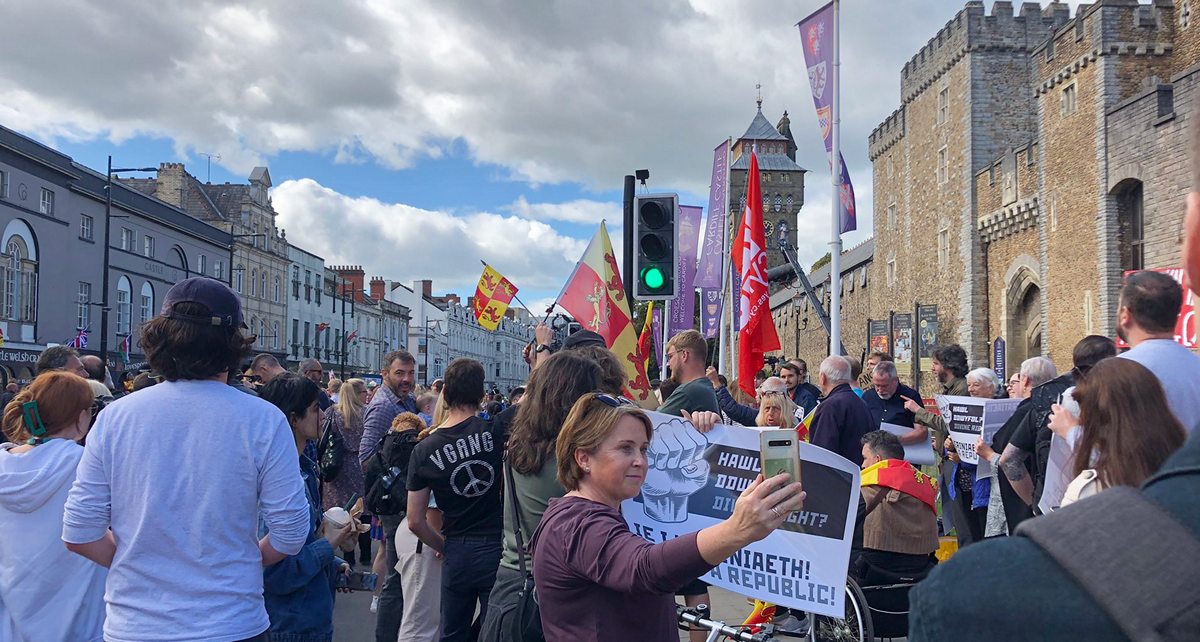
Demonstration outside
Cardiff Castle on the occasion of King Charles III's visit, September
16, 2022, renounces the monarchy and declares Wales doesn't need a
prince.
The constant message fed by "King Charles
III" and all his courtiers, including first and foremost the BBC, is
that throughout her long reign the Queen helped maintain social
"stability" and ensured "continuity" of rule. Similarly, it is the
central message delivered by Charles about his own "reign." The
essence of the "King's Declaration" delivered on September 10 to the
700 or so Privy Councillors after the official "Proclamation of King
Charles III" is: "I shall strive to follow the
inspiring example I have been set in upholding constitutional
government and to seek the peace, harmony and prosperity of the peoples
of these Islands and of the Commonwealth Realms and Territories
throughout the world." He speaks of "the
irreparable loss" that "the whole world" has suffered. Prior
to this, in his "Inaugural Address" delivered from Balmoral Castle in
Scotland on September 9, the day after the Queen died, "King" Charles
tells us that "in her life of service we saw that abiding love of
tradition, together with that fearless embrace of progress, which make
us great as Nations. "[...]In the course of the
last 70 years we have seen our society become one of many cultures and
many faiths. The institutions of the State have changed in turn. But,
through all changes and challenges, our nation and the wider family of
Realms -- of whose talents, traditions and achievements I am so
inexpressibly proud -- have prospered and flourished. Our values have
remained, and must remain, constant. "The role and
the duties of Monarchy also remain, as does the Sovereign's particular
relationship and responsibility toward the Church of England -- the
Church in which my own faith is so deeply rooted. In that faith, and
the values it inspires, I have been brought up to cherish a sense of
duty to others, and to hold in the greatest respect the precious
traditions, freedoms and responsibilities of our unique history and our
system of parliamentary government. "... I too now
solemnly pledge myself, throughout the remaining time God grants me, to
uphold the Constitutional principles at the heart of our nation. And
wherever you may live in the United Kingdom, or in the Realms and
territories across the world, and whatever may be your background or
beliefs, I shall endeavour to serve you with loyalty, respect and love,
as I have throughout my life." 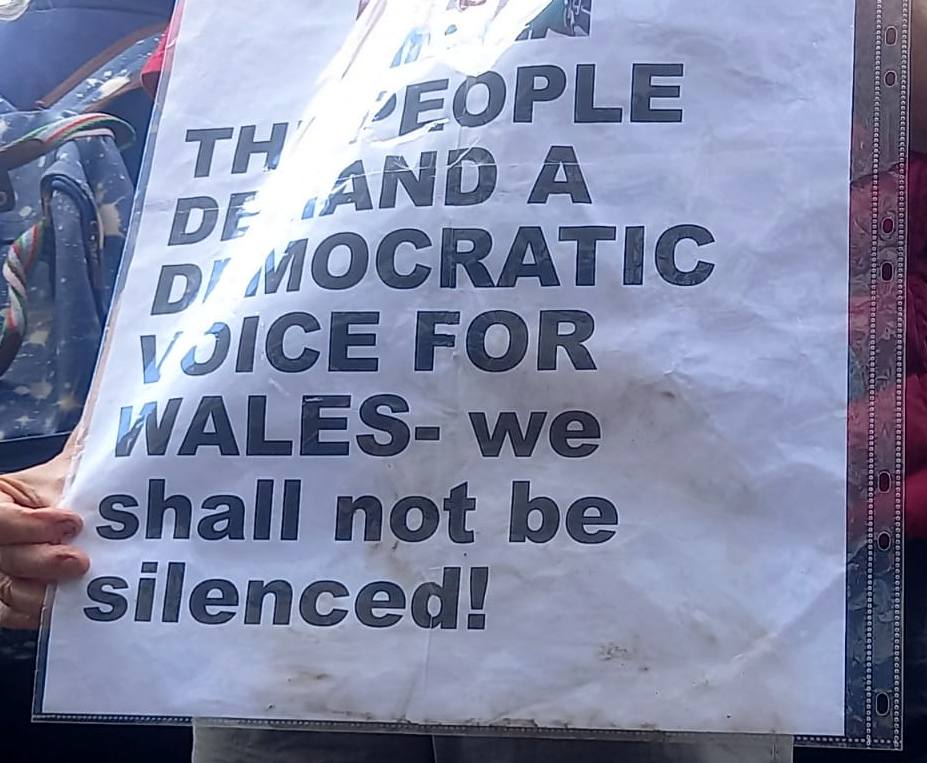 The promotion of
the "younger Royals" allegedly leading "national conversations" is
another show of hubris which comes with entitlement. Charles said: The promotion of
the "younger Royals" allegedly leading "national conversations" is
another show of hubris which comes with entitlement. Charles said:
"[...] our new Prince and Princess of Wales will, I know,
continue to inspire and lead our national conversations, helping to
bring the marginal to the centre ground where vital help can be given.
About the significance of the funeral, he once again
emphasizes empire. He says, "[...] In a little over a week's time we
will come together as a nation, as a Commonwealth and indeed a global
community, to lay my beloved mother to rest. In our sorrow, let us
remember and draw strength from the light of her example."

Stability for Whom and With
What Aim? We are told the hereditary passing of
immense power and privilege from god-appointed mother to son to "reign
over us" is a fait accompli, a matter of "stability" in a changing
world. Stability for whom we must ask, and with what aim? 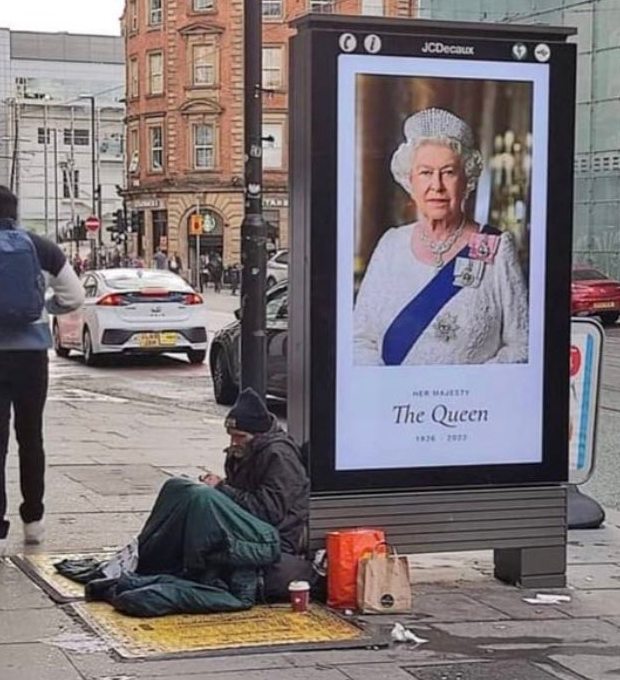 Can we say that there has been
stability for the working people and the oppressed of the world, or of
the Commonwealth countries or of Britain or Canada because of such
anachronistic institutions and arrangements? What about all the
countries and peoples that have been the victims of British rule and
forms of governance called "peace, order and good government?" Can we say that there has been
stability for the working people and the oppressed of the world, or of
the Commonwealth countries or of Britain or Canada because of such
anachronistic institutions and arrangements? What about all the
countries and peoples that have been the victims of British rule and
forms of governance called "peace, order and good government?"
Peace signified the brutal suppression of the struggles of the
colonized peoples for independence. "Order" meant the establishment of
the system of courts, police, and prisons to keep the working people in
check and to deal with political and economic rivals. "Good government"
refers to the system of party rule and elections that make sure the
people are divided and cannot formulate and implement a nation-building
agenda of their own that favours them, not the rich and their rule.
Has this "constitutional order" brought stability for the
people? Of course not. Even the rich and the rulers bemoan the fact
every day that everything is out of their control. No matter what
dictates they issue to force people to submit to them and to control
the productive forces, the productive powers are growing exponentially
and have broken the bounds of anyone's control.

How Charles III Intends to
"Modernize
the Monarchy"
An example
of how King Charles intends to implement his desire to "modernize the
monarchy" can be seen in the statement that the relationship between
the Indigenous peoples and the Crown will remain intact.
The fact is that a federal day of mourning has been declared
for the Queen when she is being buried but no such day was declared to
mourn the missing children sent to residential schools when the first
set of unmarked graves were uncovered in May 2021. Instead, it was the
people who took their own measures to have public mourning ceremonies
and vigils. This goes to the heart of the matter of the kind of
relations that exist between the Crown and the Indigenous peoples.
It is also an example of how the death of the Queen and the
ascension of Charles to the throne are used to cover up all the
historical crimes of the rule of the monarchy and divert from the need
to renew the constitutional order by replacing it with a Constitution
adopted by the people that vests the sovereign decision-making power in
their hands, not those of a ruling elite. It is
high time the colonial relations with the monarchy and the undemocratic
constitutional order and institutions are ended. The constitutional
order based on the monarchy and the Westminster system of rule has
split society in two -- the wealthy, privileged and degenerate element
has set itself up to rule over the whole of society. This is nothing
worthy of praise. 
Letters to the Editor From
Our Readers  We have our own
experience with
this constitutional monarchy and we must defend the honour and memory
of all those who asserted their right to be and their right of
conscience by refusing to submit to the arbitrary power of the crown
and the mounted police of "his majesty." We are the patriots of Lower
and Upper Canada hung and sent into exile for attempting a
nation-building project based on the equality of all. We are Louis
Riel, the Métis, and Indigenous peoples who fought for our
right to be against the violence of the propertied interests
represented by the Crown. We are the Chinese and East Indians denied
equal rights because the constitutional order decides who is legitimate
and who is not. We are the young men who refused to fight for the
British Empire in the First World War and whose demonstrations were
suppressed by armed force, as were our strikes for the right to live
and work in dignity. So too are we the Slavs, Irish, Portuguese,
Greeks, Italians, Africans, Arabs, Latin American and Caribbean peoples
and all others who are subject to assimilation or integration to prove
their worth. We are the patriotic intellectuals and workers of Quebec
and Canada who opposed the War Measures Act
and all those who oppose state-organized racist attacks, human
trafficking and the wars of aggression waged to impose this
constitutional order on the peoples of the world. We are the working
class of Canada and Quebec which clearly states that our future lies in
the defence of the rights of all. The workings of the constitutional
order based on racism and privilege are under fire by all those who
fight for life itself by taking up the responsibility to humanize the
natural and social environment in a manner which favours the people,
not the rich. We have our own
experience with
this constitutional monarchy and we must defend the honour and memory
of all those who asserted their right to be and their right of
conscience by refusing to submit to the arbitrary power of the crown
and the mounted police of "his majesty." We are the patriots of Lower
and Upper Canada hung and sent into exile for attempting a
nation-building project based on the equality of all. We are Louis
Riel, the Métis, and Indigenous peoples who fought for our
right to be against the violence of the propertied interests
represented by the Crown. We are the Chinese and East Indians denied
equal rights because the constitutional order decides who is legitimate
and who is not. We are the young men who refused to fight for the
British Empire in the First World War and whose demonstrations were
suppressed by armed force, as were our strikes for the right to live
and work in dignity. So too are we the Slavs, Irish, Portuguese,
Greeks, Italians, Africans, Arabs, Latin American and Caribbean peoples
and all others who are subject to assimilation or integration to prove
their worth. We are the patriotic intellectuals and workers of Quebec
and Canada who opposed the War Measures Act
and all those who oppose state-organized racist attacks, human
trafficking and the wars of aggression waged to impose this
constitutional order on the peoples of the world. We are the working
class of Canada and Quebec which clearly states that our future lies in
the defence of the rights of all. The workings of the constitutional
order based on racism and privilege are under fire by all those who
fight for life itself by taking up the responsibility to humanize the
natural and social environment in a manner which favours the people,
not the rich.
- Reader in the
Outaouais
Canadians are told that unlike the Caribbean countries that are
breaking away from monarchy and establishing republics, Canada will not
be able to do so because the Canadian constitution would make such an
amendment virtually impossible. It is clear that if a constitution
denies the ability of the people to have a say in anything, then the
only thing to do is to develop a modern one of our own that affirms
that the time of monarchs and royal privileges and prerogatives must
give way to the people as decision-makers on matters that affect them.
- Reader in Vancouver
The
death of the Queen and ascension to the Throne of England
of a new monarch provides a historic opportunity to advocate the
non-succession of the monarchy in Quebec. It opens the way for changes
and democratic renewal that are needed. It is a renewed affirmation of
our right to be that will define our identity in change. Getting rid of
the current constitutional order with a foreign monarch as head of
state will remove a heavy weight on society which blocks change. The
institution of the monarchy is a straitjacket that has no place in a
modern Canada or Quebec. -
Reader in Sherbrooke, Quebec 
For
Your Information
The Proclamation of King Charles
III, St. James Palace, London, England -- September 10, 2022
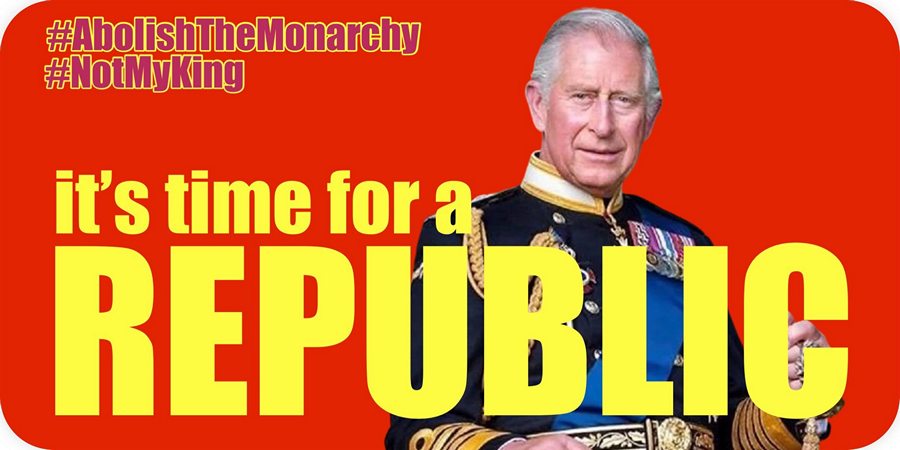 Whereas it has
pleased Almighty God to call to His Mercy our late Sovereign Lady Queen
Elizabeth the Second of Blessed and Glorious Memory, by whose Decease
the Crown of the United Kingdom of Great Britain and Northern Ireland
is solely and rightfully come to The Prince Charles Philip Arthur
George: We, therefore, the Lords Spiritual and Temporal of this Realm
and Members of the House of Commons, together with other members of Her
late Majesty's Privy Council and representatives of the Realms and
Territories, Aldermen and Citizens of London, and others, do now hereby
with one voice and Consent of Tongue and Heart publish and proclaim
that The Prince Charles Philip Arthur George is now, by the Death of
our late Sovereign of Happy Memory, become our only lawful and rightful
Liege Lord Charles the Third, by the Grace of God of the United Kingdom
of Great Britain and Northern Ireland and of His other Realms and
Territories, King, Head of the Commonwealth, Defender of the Faith, to
whom we do acknowledge all Faith and Obedience with humble Affection;
beseeching God by whom Kings and Queens do reign to bless His Majesty
with long and happy Years to reign over us. Whereas it has
pleased Almighty God to call to His Mercy our late Sovereign Lady Queen
Elizabeth the Second of Blessed and Glorious Memory, by whose Decease
the Crown of the United Kingdom of Great Britain and Northern Ireland
is solely and rightfully come to The Prince Charles Philip Arthur
George: We, therefore, the Lords Spiritual and Temporal of this Realm
and Members of the House of Commons, together with other members of Her
late Majesty's Privy Council and representatives of the Realms and
Territories, Aldermen and Citizens of London, and others, do now hereby
with one voice and Consent of Tongue and Heart publish and proclaim
that The Prince Charles Philip Arthur George is now, by the Death of
our late Sovereign of Happy Memory, become our only lawful and rightful
Liege Lord Charles the Third, by the Grace of God of the United Kingdom
of Great Britain and Northern Ireland and of His other Realms and
Territories, King, Head of the Commonwealth, Defender of the Faith, to
whom we do acknowledge all Faith and Obedience with humble Affection;
beseeching God by whom Kings and Queens do reign to bless His Majesty
with long and happy Years to reign over us.
Given
at St. James's Palace this tenth day of September in the year of Our
Lord two thousand and twenty-two. GOD SAVE THE KING

Official Canadian Delegation
Attending
Queen's Funeral The Prime Minister's Office
(PMO) provides the following list of who is attending the Funeral of
Queen Elizabeth II on September 19, 2022. - Prime
Minister Justin Trudeau and his wife, Sophie Grégoire Trudeau
- Governor General Mary Simon and her husband, Whit Fraser
- Former Governors General Michaëlle Jean and David
Johnston - Former Prime Ministers Kim Campbell,
Jean Chrétien, Paul Martin and Stephen Harper -
Assembly of First Nations National Chief RoseAnne Archibald, President
of Inuit Tapiriit Kanatami Natan Obed and President of the
Métis National Council Cassidy Caron -
Clerk of the Privy Council and Secretary to the Cabinet and former High
Commissioner for Canada in the United Kingdom of Great Britain and
Northern Ireland, Janice Charette - High
Commissioner for Canada to the United Kingdom of Great Britain and
Northern Ireland, Ralph Goodale. The PMO informs
that members of the Royal Canadian Mounted Police and representatives
of regiments of the Canadian Armed Forces join uniformed personnel from
other Commonwealth countries in the procession as do members of the
Order of Canada Mark Tewksbury, Gregory Charles and Sandra Oh, and
Cross of Valour recipient Leslie Arthur Palmer who will participate in
a procession of recipients of national honours. The
PMO also announces that a national commemorative ceremony is being held
at Christ Church Cathedral, the Anglican cathedral in Ottawa, attended
by former Prime Ministers Brian Mulroney and Joe Clark. It says all
Members of Parliament have been invited and that the ceremony is being
broadcast live "for everyone to watch." 
Transition of the Crown --
What Government of Canada Says It Means for Canadians The following
information is the sum total of what the Government of Canada released
on September 12 to explain the meaning to Canadians of the death of the
Queen. Accession
The accession is the moment when a new Sovereign assumes the
throne upon the death of the previous King or Queen. The King
automatically became Sovereign of Canada on the passing of Queen
Elizabeth II. Members of The Queen's Privy Council for Canada assembled
to proclaim the accession of the new Sovereign. The
accession event in Canada was held at Rideau Hall on Saturday,
September 10, 2022. The proclamation was issued on the authority of an
order in council to announce the demise of the Crown and the accession
to the throne of the new Sovereign. "Whereas our
late Sovereign, Queen Elizabeth the Second, passed away on September 8,
2022, by whose death the Crown of Canada vests in His Royal Highness
Prince Charles Philip Arthur George; "We, the Right
Honourable Mary May Simon, Governor General of Canada, assisted by His
Majesty's Privy Council for Canada, proclaim that His Royal Highness
Prince Charles Philip Arthur George is now, by the death of our late
Sovereign, Charles the Third, by the Grace of God of the United
Kingdom, Canada and His other Realms and Territories King, Head of the
Commonwealth, Defender of the Faith, to whom we acknowledge faith and
allegiance. "Given at Ottawa, this tenth day of
September, two thousand and twenty-two. "Long Live
the King" - Proclamation read by Dr. Samy Khalid,
Chief Herald of Canada, Ottawa, September 10, 2022 Canadian
currency, passports, and official documents
Canadian currency that bears the image of Her
Majesty remains legal tender and can still be used. This is also the
case with passports and other official documents. Allegiance
People who have sworn allegiance to Her Majesty do not need to
swear allegiance to the new Sovereign. Honorary
positions and military appointments Her
Majesty's honorary positions and military appointments do not
automatically transfer to the new Sovereign. The
Governor General of Canada and the lieutenant governors remain in
office. The
Governor General and the ten lieutenant governors represent the Crown
in Canada and act on behalf of the Sovereign, Canada's Head of State.
Constitutional monarchy As
per the terms of the Canadian Constitution, Canada will continue to be
a constitutional monarchy. 
Monarchy of Canada -- What
Wikipedia Has to Say While the Wikipedia
description of the Monarchy of Canada seems accurate enough, what does
it even mean when it comes to the claim that we elect our
representatives and thus have a representative democracy but the people
who represent us owe their allegiance to the monarch? The Wikipedia
explanation puts it this way: "While the power for
these acts (of the executive) stems from the Canadian people through
the constitutional conventions of democracy, executive authority
remains vested in the Crown and is only entrusted by the sovereign to
the government on behalf of the people. This underlines the Crown's
role in safeguarding the rights, freedoms, and democratic system of
government of Canadians, reinforcing the fact that 'governments are the
servants of the people and not the reverse.'" Wikipedia
reads: "The monarchy of Canada is Canada's form of
government embodied by the Canadian sovereign and head of state. It is
at the core of Canada's constitutional federal structure and
Westminster-style parliamentary democracy. The monarchy is the
foundation of the executive (King-in-Council), legislative
(King-in-Parliament), and judicial (King-on-the-Bench) branches of both
federal and provincial jurisdictions. The king of Canada is Charles III.
"Although the person of the sovereign is shared with 14 other
independent countries within the Commonwealth of Nations, each
country's monarchy is separate and legally distinct. As a result, the
current monarch is officially titled King of Canada and, in this
capacity, he and other members of the royal family undertake public and
private functions domestically and abroad as representatives of Canada.
However, the King is the only member of the royal family with any
constitutional role. While some powers are exercisable only by the
sovereign, most of the monarch's operational and ceremonial duties
(such as summoning the House of Commons and accrediting ambassadors)
are exercised by their representative, the governor general of Canada.
In Canada's provinces, the monarch in right of each is represented by a
lieutenant governor. As territories fall under the federal
jurisdiction, they each have a commissioner, rather than a lieutenant
governor, who represents the federal Crown-in-Council directly.
"As all executive authority is vested in the sovereign, royal
assent is required to allow for bills to become law and for letters
patent and orders in council to have legal effect. While the power for
these acts stems from the Canadian people through the constitutional
conventions of democracy, executive authority remains vested in the
Crown and is only entrusted by the sovereign to the government on
behalf of the people. This underlines the Crown's role in safeguarding
the rights, freedoms, and democratic system of government of Canadians,
reinforcing the fact that 'governments are the servants of the people
and not the reverse.' Thus, within Canada's constitutional monarchy the
sovereign's direct participation in any of these areas of governance is
normally limited, with the sovereign typically exercising executive
authority only with the advice and consent of the Cabinet of Canada,
and the sovereign's legislative and judicial responsibilities largely
carried out through the Parliament of Canada as well as judges and
justices of the peace. However, there are cases where the sovereign or
their representative would have a duty to act directly and
independently under the doctrine of necessity to prevent genuinely
unconstitutional acts." To grasp what this is all
about, let us see what the "doctrine of necessity" is about. From the
vantage point of the working people of Canada and Quebec and the
Indigenous peoples, Inuit and Métis, this "doctrine" is
vile. Furthermore, it is not an exception but the rule. It reveals the
essence and aim of Canada's constitutional order.
At a time when laws are frequently passed which permit the unfettered
use of the executive powers and everything has become a permanent state
of exception, government of police powers has become the new normal.
About the "doctrine of necessity," Wikipedia explains the
following: "The doctrine of necessity is the basis
on which extra-constitutional actions by administrative authority,
which are designed to restore order or attain power on the pretext of
stability, are considered to be lawful even if such an action
contravenes established constitution, laws, norms, or conventions. The
maxim on which the doctrine is based originated in the writings of the
medieval jurist Henry de Bracton, and similar justifications for this
kind of extra-legal action have been advanced by more recent legal
authorities, including William Blackstone." Bracton,
aka Henry Bretton lived from 1210 to 1268 so he was definitely
addressing medieval concerns and the struggles for power under those
conditions. The "more recent" legal authority, William Blackstone, was
not so recent either, having lived from 1723 to 1780. He wrote the
famous four volume opus titled Commentaries on the Laws of
England which continues to be the most influential treatise
on English Common Law. Besides English Common Law being imported in
toto into Canadian law when the British North America Act was
imposed on Canada in 1867, all of which remained in force in the
patriated version in 1982, it also guided the writers of the American
Constitution which explains why, even though the U.S. is a republic,
not a monarchy, the system of government and rule is also based on
prerogative powers which direct the presidential, legislative and
judicial orders of government. According to
Wikipedia, thanks to the way the monarchy works, "the Crown primarily
functions as a guarantor of continuous and stable governance and a
nonpartisan safeguard against abuse of power. The sovereign acts as a
custodian of the Crown's democratic powers and a representation of the
"power of the people above government and political parties."
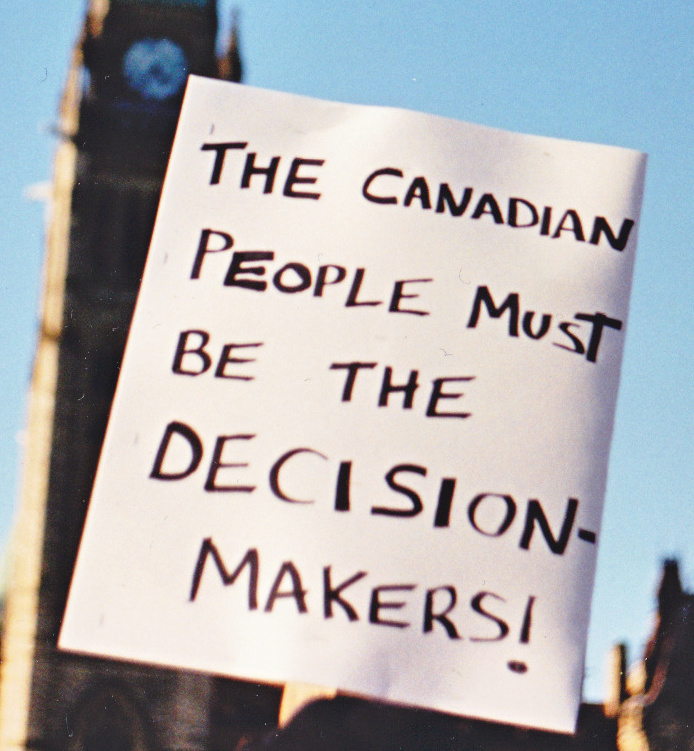 The
Marxist-Leninist Party of Canada urges its readers to convoke study
groups which delve into what the monarchy is in Canada and the essence
of the constitutional order it enforces. An understanding of who
controls the decision-making process in a country and how the
decision-making power is exercised is key when the working class and
people from all walks of life provide themselves with suitable guides
to action when seeking justice and redress. The
Marxist-Leninist Party of Canada urges its readers to convoke study
groups which delve into what the monarchy is in Canada and the essence
of the constitutional order it enforces. An understanding of who
controls the decision-making process in a country and how the
decision-making power is exercised is key when the working class and
people from all walks of life provide themselves with suitable guides
to action when seeking justice and redress.
The
Party Press will also continue to provide pertinent information on this
matter. The Wikipedia entry "Monarchy in Canada" is not a bad place to
start along with the expressions of the experiences and statements from
all sides of the political spectrum. Not surprisingly, the Wikipedia
explanation does not provide answers to the pertinent questions when
inquiring about monarchy in Canada. Those answers will come from those
posing the pertinent questions when they seek solutions to the problems
they face as individuals, collectives and members of society. Most
importantly, the answers will be understood by all the human persons
who are keen on uniting in action with all others to humanize the
natural and social environment in favour of the peoples of the world.

Who Said What at September
15 Special Session
of House of Commons Called to Pay Homage
to the Queen The report carried by the
National Post
on the Special Session of the House of Commons convoked on September 15
to pay homage to the Queen reads: "MPs in Ottawa
paid tribute to her late majesty Queen Elizabeth II on September 15,
but at least one party leader argued it's time Canadians have a
discussion about moving past the monarchy. Bloc
Québécois Leader Yves-François
Blanchet paid condolences to the Queen's family, but said his MPs would
not take part in the tributes, noting Quebec's history with the
monarchy was 'thorny and cruel.' "Bloc
Québécois MPs stayed through the leader's
speeches and a moment of silence, but left shortly after as the House
passed a motion offering condolences and support for King Charles'
ascension to the throne. Outside the chamber Blanchet said the monarchy
is an anachronism and it is time to consider something different.
"'Let's arrive in the 21st century and see that any power
which is supposedly based on divine right, which has so much influence
and is so terribly expensive, might be considered as something of the
past,' he said." Good for the Bloc
Québécois for taking a dignified position which
represents the interests of the Quebec people and nation. Blanchet's
formal statement at the September 15 session follows: "Mr.
Speaker, on behalf of the Bloc Québécois, its
elected officials, members and staff, I would simply like to express my
condolences to anyone who is grieving the death of Queen Elizabeth II.
"We, as nationalists and sovereignists, do this only after
much deliberation amongst ourselves. Everyone's feelings should be
considered through a historical lens. The history between the British
Crown and the Quebec nation is full of dark and sometimes even cruel
times. Our history and values irrevocably separate us. "However,
respect must come first, and so we have a duty to distinguish between
the person's institution and policies and sincere grief. It is
therefore with no ulterior motives that we express our deepest
condolences to the people of England who are grieving. "I
think members will understand when, after the leaders have given their
messages of condolences and we have observed a minute of silence here
in the House, the members of the Bloc Québécois
withdraw from the chamber and allow Canadian MPs to continue their
tributes. "I invite all members to later reflect on
this situation. In the meantime, our thoughts are with those who are
mourning the loss of someone who was a prominent figure over the past
three-quarters of a century."
What the Other Party Leaders Had to Say
Prime Minister Trudeau: "Many words have been used to describe the
qualities that mark the legacy of her majesty, words like duty,
service, devotion and stability." "For her majesty, public service was
her entire life. Right up until the very end. She had an unflinching,
enduring commitment to service and to building a better world and a
better future." "Today the world is in a tough
place," Trudeau said. "We're all reeling from an unprecedented global
pandemic. [Russian President Vladimir] Putin's brutal and unjustifiable
war is threatening global stability. Around the globe, democratic
institutions are being challenged. "But Canadians
can rightly be proud of living in one of the strongest democracies in
the world. Our institutions are healthy, our debates are robust. It is
this very strength and stability, represented by the Crown and embodied
by the Queen, that Canadians have always benefited from." Leader
of the Loyal Opposition, the Conservative Party of Canada Pierre
Poilievre: "The separation of symbolic authority from political power
allows partisan politics to be contested fearlessly without threatening
the enduring constitutional order." He added, "The Crown preserves
parliamentary democracy and the commoners practice it, as we do here in
this place." Poilievre said that while the Queen
had a special place in many Canadians' hearts, Canada also had a
special place in hers because she visited this country more than any
other. "When the Queen spoke at the patriation of
our Constitution in 1982 she said, 'The genius of Canadian federalism
lies in our consistent ability to overcome differences through reason
and compromise,'" he said. "That ability is
reflected in the willingness of ordinary people of French-speaking and
English-speaking Canada and of all regions to respect each other's
rights and to create the conditions together under which all may
prosper in freedom." Jagmeet Singh: "She reminded
us that we will get through the challenge and the pain of not being
able to see loved ones. She asked us to greet the tough times with
optimism," he said. Before the session began Singh
said there will be a time to have a discussion about the future of the
monarchy. In Parliament he called on the new King to address the
impacts of colonization and to respond to the challenges of
reconciliation. "I hope that he will meet the
challenge of reconciliation that has been laid out by First Nations
leaders," Jagmeet Singh said. 
(To
access articles individually click on the black headline.) PDF
PREVIOUS
ISSUES | HOME
Website:
www.cpcml.ca Email: office@cpcml.ca |

